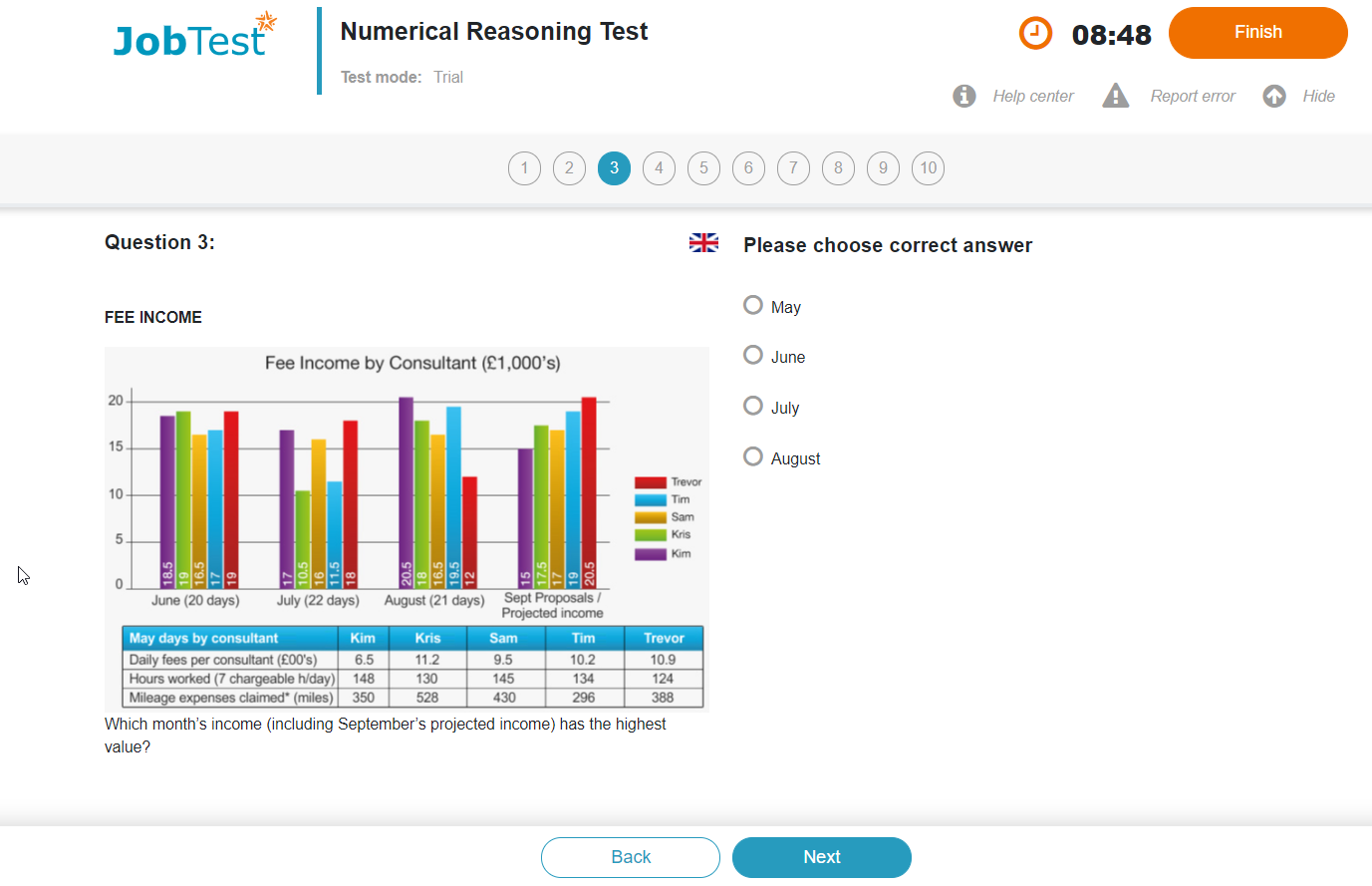
Numerical Reasoning
- Capable of efficiently and effectively identifying critical business-related issues, and logically drawing conclusions from numerical data – such as performance figures, financial results, and analysis reports
- Capable of efficiently monitoring performance and progress based on numerical metrics, such as charts and tables
- Capable of clearly presenting and conveying business-related issues in charts and tables to key stakeholders.
Competency Assessment List
-
{{ !_.isEmpty(item.question_packages) ? item.question_packages.length : 0 }}
-
{{ _.isNumber(Number(item.duration)) ? item.duration : 0 }}
-
{{ _.isNumber(item.tested) ? item.tested : 0 | money }}
Numerical reasoning tests are designed to measures an individual’s ability to interpret, analyse and draw logical conclusions based on information provided in tables, charts and figures.
The basic numerical aptitude test is typically given to candidates applying for entry-level non-managerial roles (excluding banking, finance and consulting, etc.). In these test questions candidates are given a short scenario and asked to demonstrate their ability to do simple calculations, such as adding/dividing numbers, calculating an average or a percentage increase. Typically, candidates are allowed to use a calculator in this type of numerical test.
A more complex numerical aptitude test can be given to candidates targeting entry-level non-managerial roles, as well as professional roles. This test includes question scenarios that are shorter but more complex, as well as number series. Candidates are not asked to demonstrate their arithmetical skills, rather than ability to understand numerical information quickly, and make logical and accurate decisions.
The most complex and popular type of numerical test offers candidates numerical information in the form of graphs and tables. In this test type, candidates are asked to make some business-related decisions based on the information provided. This type of test is typically given to candidates applying for complex professional and managerial roles.
See an example of this test:
The result of candidates' numerical reasoning test supports employers to discover the extent to which candidates can:
Numerical data generated by organisational systems or communicated by key stakeholders are a crucial information source to drive results, monitor progress, and achieve business goals. Hence, employers expect you to be capable of effectively collecting, interpreting, analysing, and presenting numerical data.
Employers use the result of your numerical reasoning test to learn the extent to which you are:
· Capable of efficiently and effectively identifying critical business-related issues, and logically drawing conclusions from numerical data – such as performance figures, financial results, and analysis reports
· Capable of efficiently monitoring performance and progress based on numerical metrics, such as charts and tables
· Capable of clearly presenting and conveying business-related issues in charts and tables to key stakeholders.
Target Group: Directors, Managers, Professionals, Graduates & Management Trainees
Test Structure: The numerical reasoning test consists of 10 questions with tables, graphs, charts and the duration is 10 minutes.
Relevant for Industries
- Banking & Financial Services
- Airlines
- Automotive
- Education & Training
- Logistics & Forwarding
- Life Sciences
- Manufacturing
- Oil & Gas
- NGO & Public Sector
- Retail
- Telecommunications
- General Corporate Functions
- Consulting Services
Most often tested categories
- Logical Reasoning Test
- Numerical Reasoning Test
- Verbal Reasoning Test
- Abstract Reasoning Test
- Diagrammatic Reasoning Test
- Data / Error Checking Test
- Faults Diagnosis Test
- Mechanical Reasoning Test
- Critical Reasoning Test
- Situational Judgment Test (SJT)
- Psychometric Test
- Tư Duy Không Gian
- Post-training Test
- English Reading Test
- Situational Judgement Test (SJT)
- DISC Awareness
- English Skill
- GOLD 2024 - English Test
- Product Knowledge
- English Listening Test
- Numerical Reasoning
- Verbal Reasoning
- Non-verbal Reasoning
- Situational Judgement
- Critical Thinking
- Problem Solving
- Job & Income
- Managers, Colleagues
- Company
- EVP
- CT Group
- Essay
- Abstract Reasoning Test
- Numerical Reasoning Test
- Critical Reasoning Test
- Situational Judgment Test (SJT)










